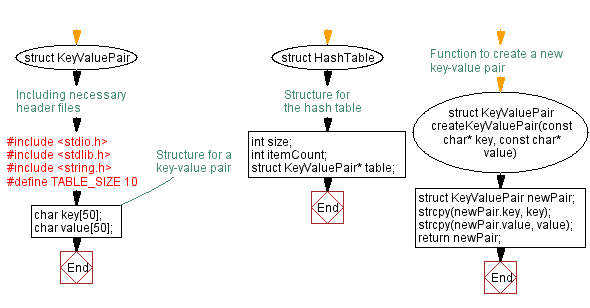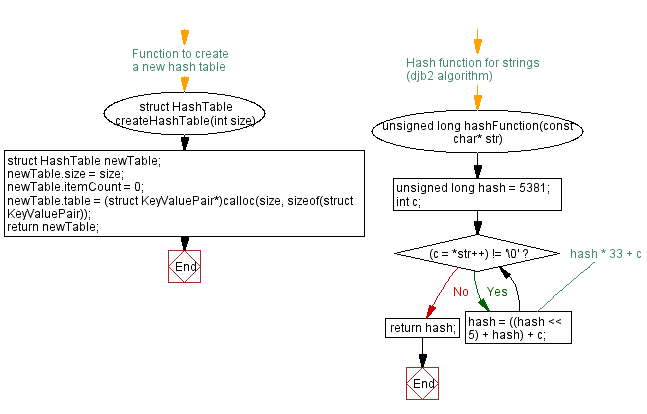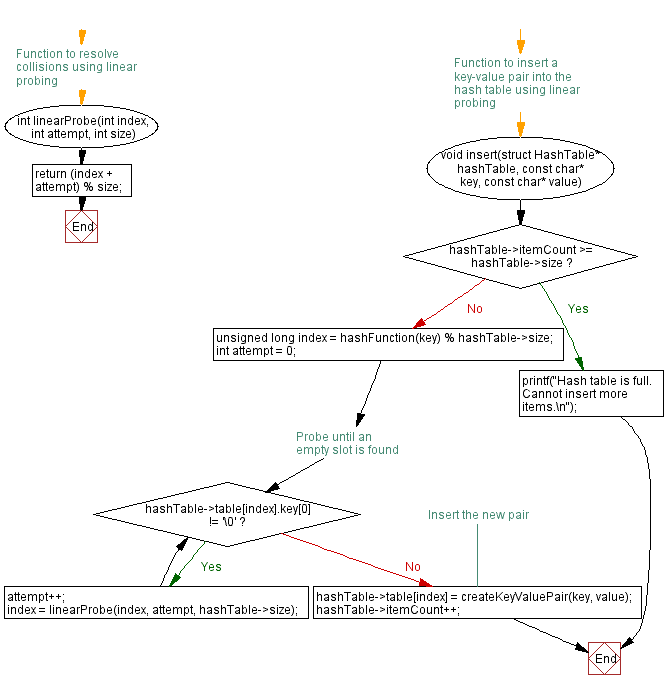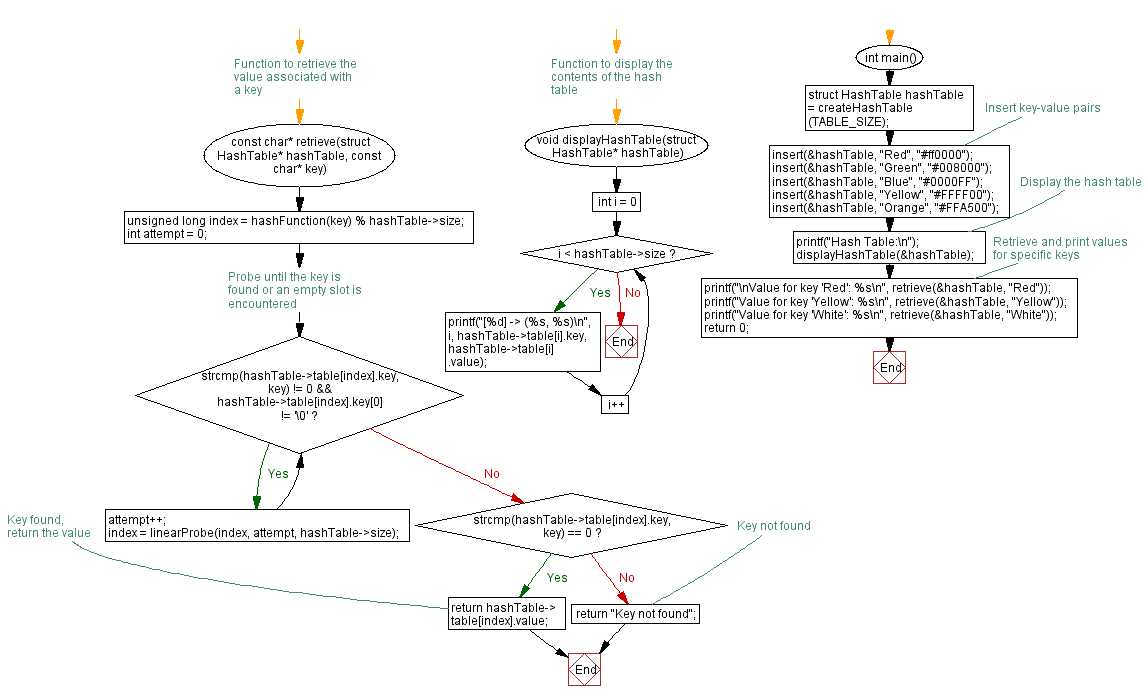C Program: Hash Table with Open Addressing
7. Open Addressing Techniques Challenges
Write a C program that implements a hash table using open addressing techniques like linear probing or quadratic probing to resolve collisions.
Sample Solution:
C Code:
// Including necessary header files
#include <stdio.h>
#include <stdlib.h>
#include <string.h>
#define TABLE_SIZE 10
// Structure for a key-value pair
struct KeyValuePair {
char key[50];
char value[50];
};
// Structure for the hash table
struct HashTable {
int size;
int itemCount;
struct KeyValuePair* table;
};
// Function to create a new key-value pair
struct KeyValuePair createKeyValuePair(const char* key, const char* value) {
struct KeyValuePair newPair;
strcpy(newPair.key, key);
strcpy(newPair.value, value);
return newPair;
}
// Function to create a new hash table
struct HashTable createHashTable(int size) {
struct HashTable newTable;
newTable.size = size;
newTable.itemCount = 0;
newTable.table = (struct KeyValuePair*)calloc(size, sizeof(struct KeyValuePair));
return newTable;
}
// Hash function for strings (djb2 algorithm)
unsigned long hashFunction(const char* str) {
unsigned long hash = 5381;
int c;
while ((c = *str++) != '\0') {
hash = ((hash << 5) + hash) + c; // hash * 33 + c
}
return hash;
}
// Function to resolve collisions using linear probing
int linearProbe(int index, int attempt, int size) {
return (index + attempt) % size;
}
// Function to insert a key-value pair into the hash table using linear probing
void insert(struct HashTable* hashTable, const char* key, const char* value) {
if (hashTable->itemCount >= hashTable->size) {
printf("Hash table is full. Cannot insert more items.\n");
return;
}
unsigned long index = hashFunction(key) % hashTable->size;
int attempt = 0;
// Probe until an empty slot is found
while (hashTable->table[index].key[0] != '\0') {
attempt++;
index = linearProbe(index, attempt, hashTable->size);
}
// Insert the new pair
hashTable->table[index] = createKeyValuePair(key, value);
hashTable->itemCount++;
}
// Function to retrieve the value associated with a key
const char* retrieve(struct HashTable* hashTable, const char* key) {
unsigned long index = hashFunction(key) % hashTable->size;
int attempt = 0;
// Probe until the key is found or an empty slot is encountered
while (strcmp(hashTable->table[index].key, key) != 0 && hashTable->table[index].key[0] != '\0') {
attempt++;
index = linearProbe(index, attempt, hashTable->size);
}
if (strcmp(hashTable->table[index].key, key) == 0) {
return hashTable->table[index].value; // Key found, return the value
} else {
return "Key not found"; // Key not found
}
}
// Function to display the contents of the hash table
void displayHashTable(struct HashTable* hashTable) {
for (int i = 0; i < hashTable->size; i++) {
printf("[%d] -> (%s, %s)\n", i, hashTable->table[i].key, hashTable->table[i].value);
}
}
int main() {
struct HashTable hashTable = createHashTable(TABLE_SIZE);
// Insert key-value pairs
insert(&hashTable, "Red", "#ff0000");
insert(&hashTable, "Green", "#008000");
insert(&hashTable, "Blue", "#0000FF");
insert(&hashTable, "Yellow", "#FFFF00");
insert(&hashTable, "Orange", "#FFA500");
// Display the hash table
printf("Hash Table:\n");
displayHashTable(&hashTable);
// Retrieve and print values for specific keys
printf("\nValue for key 'Red': %s\n", retrieve(&hashTable, "Red"));
printf("Value for key 'Yellow': %s\n", retrieve(&hashTable, "Yellow"));
printf("Value for key 'White': %s\n", retrieve(&hashTable, "White"));
return 0;
}
Output:
Hash Table: [0] -> (Green, #008000) [1] -> (Blue, #0000FF) [2] -> (Orange, #FFA500) [3] -> (, ) [4] -> (, ) [5] -> (, ) [6] -> (, ) [7] -> (, ) [8] -> (Red, #ff0000) [9] -> (Yellow, #FFFF00) Value for key 'Red': #ff0000 Value for key 'Yellow': #FFFF00 Value for key 'White': Key not found
Explanation:
In the exercise above,
- Structures:
- KeyValuePair: Represents a key-value pair with fields for the key and value.
- HashTable: Represents the hash table with fields for size, item count, and an array of key-value pairs.
- Hash Function (hashFunction):
- Utilizes the djb2 algorithm to hash strings and generate an index.
- Probing Function (linearProbe):
- Resolves collisions using linear probing, which means it probes linearly through the array until an empty slot is found.
- createKeyValuePair Function:
- Creates a new key-value pair.
- createHashTable Function:
- Creates a new hash table with a specified size.
- insert Function:
- Inserts a key-value pair into the hash table.
- Uses the hash function to find an initial index and linear probing to handle collisions.
- retrieve Function:
- Retrieves the value associated with a key from the hash table.
- Utilizes the hash function and linear probing to find the correct index.
- displayHashTable Function:
- Displays the contents of the hash table.
- main Function:
- Create a hash table.
- Inserts several key-value pairs into the hash table.
- Displays the contents of the hash table.
- Retrieves and prints values for specific keys.
Flowchart




For more Practice: Solve these Related Problems:
- Write a C program to implement a hash table using linear probing and analyze the probe sequences generated during collisions.
- Write a C program to implement a hash table using quadratic probing and demonstrate its effectiveness in reducing clustering.
- Write a C program to implement a hash table using double hashing as an open addressing strategy for collision resolution.
- Write a C program to report the number of probes per insertion in a hash table using open addressing techniques.
Go to:
PREV : Hash Table Statistics Challenges.
NEXT : Collision Resolution Performance Comparison Challenges.
C Programming Code Editor:
Have another way to solve this solution? Contribute your code (and comments) through Disqus.
What is the difficulty level of this exercise?
Test your Programming skills with w3resource's quiz.
